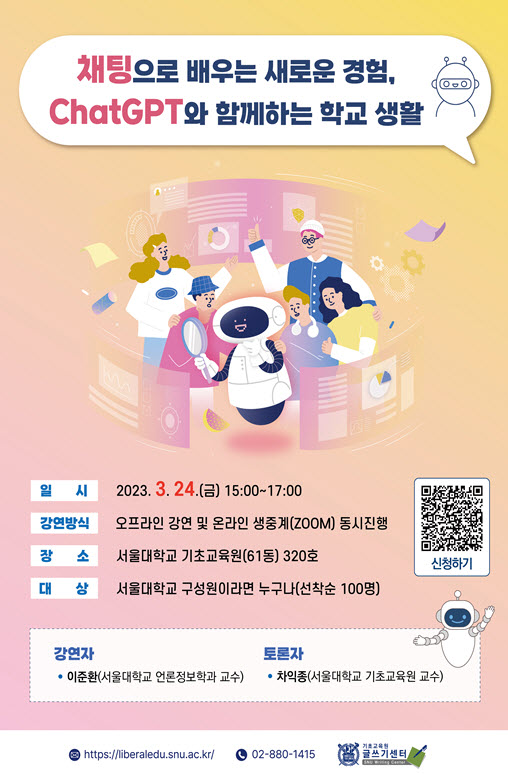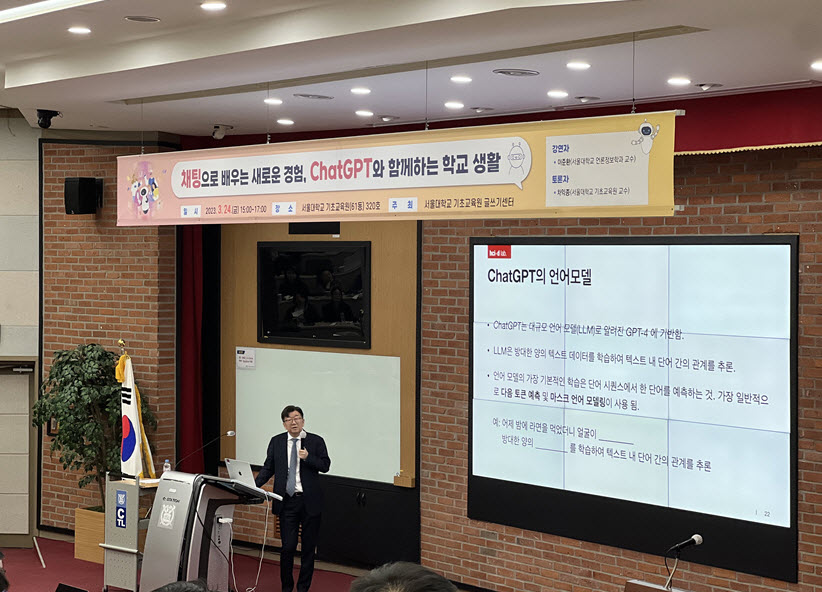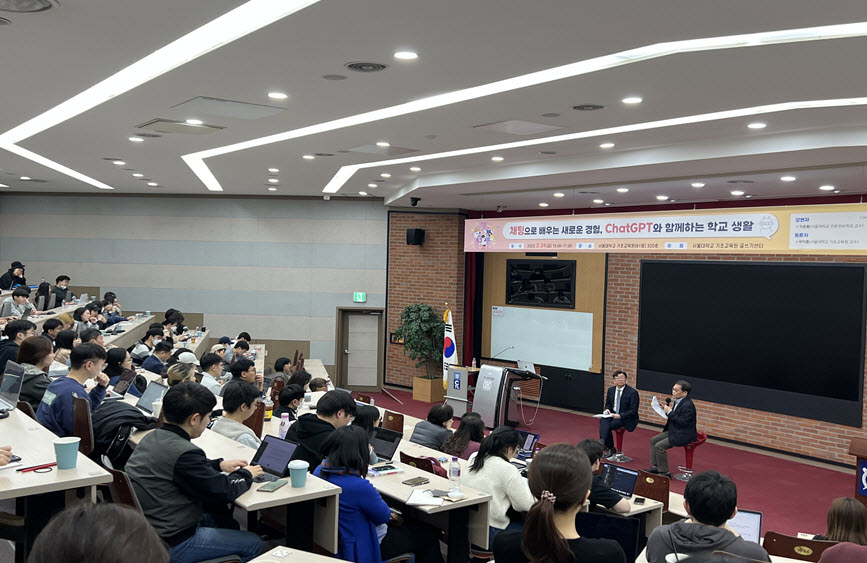‘ChatGPT’ has recently been receiving much spotlight and attention by media and the general public. Generated by OpenAI, ChatGPT is an interactive AI language model that is able to access large amount of data to provide answers to users’ questions. ChatGPT, changing the former paradigm of artificial intelligence, has raised questions on the co-existence of humans and AI. On Friday, March 24th, the Faculty of Liberal Education at SNU opened a special lecture on the theme “New Learning Experience through Online Chatting: Special Lecture on School Life with ChatGPT” in Bldg. 61, room 320. Starting with a lecture by Professor Lee Joonhwan (Department of Communication), followed by a discussion session led by Professor Cha Ik Jong (Faculty of Liberal Education), this special lecture provided the opportunity to consider the usage of ChatGPT in education settings.

On Friday, March 24th, the Faculty of Liberal Education at SNU opened a special lecture on the theme “New Learning Experience through Online Chatting: Special Lecture on School Life with ChatGPT” in Bldg. 61, room 320.
Getting familiar with ChatGPT
As the theme of the lecture was ChatGPT, Professor Lee Joonhwan stated that he eagerly used it while he prepared for the lecture. ChatGPT was able to generate the lecture title, table of contents, and even the order of the slides, and the lecture was actually conducted according to the sequence suggested by ChatGPT. The lecture started off by explaining the basic information and the functions of ChatGPT. The functional backgrounds, which are GPT language models and sentence-generating methods, were also introduced. The Large Language Model (LLM) GPT infers the relationships between words by learning from text data using a method that predicts the word following a combination of words. When a user types in a question, ChatGPT tokenizes* the text and converts it into a number format that can be processed by the language model. Then, by utilizing the pre-learned information, GPT successively predicts the tokens that would follow it and then answers users’ questions by converting the most appropriate combination back into the text form.
Next, Professor Lee suggested educational usages of ChatGPT functions, such as ▲information retrieval ▲grammar correction and expression improvement ▲translation and summarization of materials ▲writing support. He predicted that ChatGPT would be an excellent starting point for generating ideas during writing or programming processes because it logically structures materials related to specific topics. Specifically, the professor stated, "Students who are weak in writing often lack the ability to structure their thoughts rather than the ability to write sentences. In such cases, ChatGPT's assistance can be useful." Moreover, assigning ChatGPTs to play the role of both positive and negative evaluators simultaneously during brainstorming sessions could be effective in solidifying ideas. Professor Lee also introduced ways in which ChatGPT could be utilized not only during the learning process but also during evaluations. By inputting evaluation criteria such as level of completion and the accuracy of coding codes, ChatGPT could assign scores or provide detailed feedback when assignments have been submitted for evaluation. Professor Lee concluded his lecture by stating, “To increase the educational applicability of ChatGPT, the prompt** level must reach a higher level” and suggested that universities should provide education to strengthen competence in such areas.

In this special lecture, Professor Lee Joonhwan (Dept. of Communication) suggested educational applications of ChatGPT.
The Future of ChatGPT
After the lecture, there was a discussion on the topic of "ChatGPT and Writing" prepared by Professor Chai Ik Jong, followed by a Q&A session where the two professors provided answers to the questions written by the attendees in advance. Professor Chai Ik Jong stated that people are paying a great deal of interest in the ethical use of ChatGPT not only within the university but also within academia, and discussed the issue of how much of ChatGPT should be allowed in educational settings. Professor Lee Joonhwan argued that we should be cautious in blindly trusting the material generated by artificial intelligence. He emphasized that because generative AI may not be able to rigorously evaluate the qualitative nature of its data, students need to develop the ability to question and discern the provided information. Professor Cha Ik Jong also emphasized his critical stance by stating, “AI literacy, which carefully examines the principles, components, and impact of AI on our daily lives, will become a critical ability in the future.”
There were also questions about whether ChatGPT could perform important functions in areas such as creativity and empathy. Professor Lee Joonhwan said, “Creativity is an ability that improves as you see more, hear more, and copy more. The expansion of ChatGPT based on its vast amount of learning data could become helpful.” A question was also raised to Professor Cha Ik Jong, who teaches university-level writing courses, on ways to use ChatGPT in writing. Professor Cha emphasized that writing is not just about the result but also about the process of learning itself, and that it is important to use ChatGPT appropriately as a tool to structure and organize one’s work, rather than simply using it to increase one’s writing speed. The discussion continued with questions about ChatGPT and employment, as well as designing courses using ChatGPT, and the lively discussion continued.

The discussion was given in a Q&A session form, where Professor Lee Joonhwan answered questions raised by school faculty and students who had applied for it in advance.
There was also active discussion on ways to utilize ChatGPT in school settings and how to prevent its excessive use. In line with this, the special lecture and discussion had its aims in finding the balance point between artificial intelligence, represented by ChatGPT, and university life.
*Tokenization: refers to the process of dividing input text into token units that can be processed by language models. **Prompt: refers to the input value used to generate a response from a large language model (LLM) in the field of generative artificial intelligence.
Student Reporter
Kim KyuYeon (Department of Political Science & International Relations)
rbdus7522@snu.ac.kr
Translated by
InKyung Bae (Undergraduate, Department of English Language and Literature)

